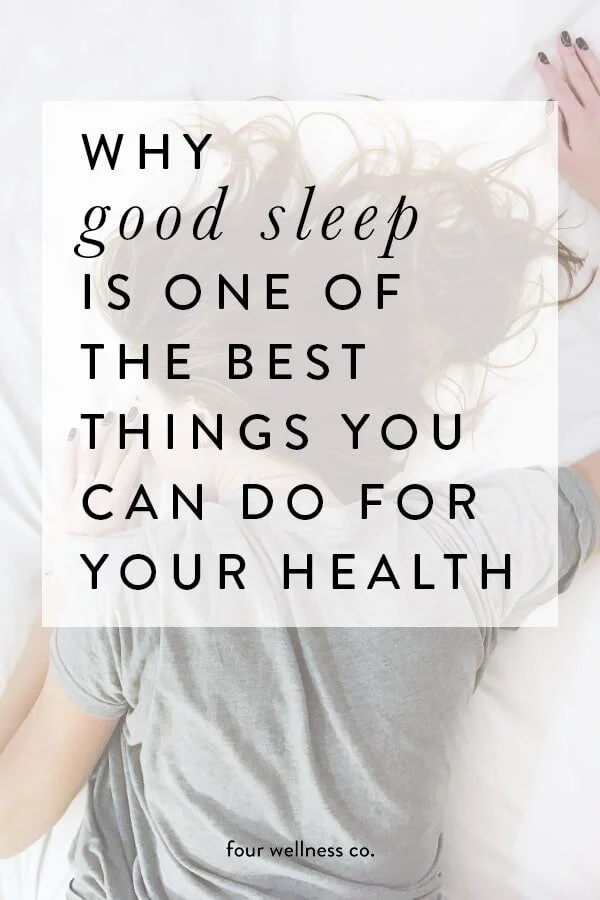Why Good Sleep Is One of the Best Things You Can Do for Your Health
This post contains affiliate links, through which we may earn a small commission if you choose to purchase, at no additional cost to you. We only share products or services we personally use & recommend!
One of the most important things you can do for overall health and well-being is: sleep.
Healthy sleep is essential for optimum energy, immunity, cognitive ability and physical strength and resilience. Good sleep helps to slow the aging process and reduce risk of illness and disease—everything from the common cold to heart disease.
While you’re asleep, your body works to:
repair tissues (including those involved in muscle growth and healing injuries)
regulate hormone levels (including those that control appetite, metabolism and stress)
form new pathways in your brain for learning and memory
process and regulate emotions
Given the essential work the body does during sleep, lack of sleep can noticeably affect all bodily functions.
The impact of sleep loss on your health
Routinely sleeping less than 6-7 hours per night can have serious health impacts:
Weight gain
Leptin, your satiety hormone, is significantly reduced when you are sleep deprived. Since leptin governs appetite and metabolism, low levels of this hormone results in hunger not being naturally suppressed. Therefore, your appetite and cravings increase. People who sleep less are more likely to be overweight, and weight loss efforts are less effective when sleep deprived—more weight loss comes from lean muscle mass rather than fat.
Weakened immune system
Without sleep, your immune system does not function optimally. Inflammatory proteins rise, which decreases your immune response and makes you more susceptible to illness and infection.
Increased risk of diabetes
Blood sugar levels rise in response to lower levels of insulin being released throughout the night. Impaired glucose tolerance can increase your risk of diabetes.
Increased risk of heart disease and stroke
Poor sleep increases your heart rate and systolic blood pressure. Combined with less vascular tissue repair (which happens during sleep), this increases the risk of heart disease and stroke.
Reduction in cancer-fighting cells
Poor sleep impairs “natural killer cells”—immune cells that keep a lookout for and attack malignant cancer cells in the body.
Increased risk of injury
When exhausted, your brain is not functioning with full awareness and concentration and you have an increased risk of accidents and injury, including stubbing your toe, cutting yourself in the kitchen, or getting into a car accident.
Increased stress hormone levels
Sleep loss results in elevated cortisol levels, which further increases your risk of developing diabetes, heart disease, immune system suppression, fertility problems and weight gain.
Impaired cognitive function
Without sufficient sleep, your mental performance suffers, impairing your ability to process new information and memories and impacting your overall mood, focus and high-level cognitive function.
Trouble managing emotions
Without sufficient rest, you may have trouble understanding or coping with your emotions. Increased feelings of irritability, anxiety, sadness and anger are common. Without the emotional regulation that occurs during sleep, you may swing more heavily between positive and negative emotions.
Reduced reproductive health
Poor sleep leads to lower sperm count and testosterone levels in men. Women who don’t sleep well may have irregular menstrual cycles, reduced ability to get pregnant, and are more likely to miscarry in the first trimester.
Benefits of quality sleep
With all the essential physiological functioning and repair that happens during sleep, emphasis on good sleep is one of the first and best things you can do to improve your overall health and well-being.
Here are some of the benefits of quality sleep:
Increased energy
Strengthened immune system
Heightened alertness, focus and creativity
Improved mood
Improved physical performance and ability to build muscle
Increased libido
Increased motivation to make beneficial lifestyle choices (cooking, exercise, self-care, etc.)
“Sleep is the single most effective thing we can do to reset our brain and body health each day.”
How much sleep do you really need?
Everyone requires quality sleep for optimal health and well-being, but the number of hours can vary depending on individual and age group. The National Sleep Foundation and Centers for Disease Control recommend 7-9 hours for adults.
But, it’s not only how much you sleep that matters—how well you sleep impacts your health as well.
Healthy sleep cycles are governed by our innate circadian rhythm, which can be intricately affected by lifestyle factors such as our diet, exercise habits, stress and exposure to light throughout the day. If you have trouble sleeping, either in quantity or quality, here are our tips for getting better sleep (naturally!).
The difference between early birds and night owls
Although we all have approximately the same 24-hour circadian rhythm that governs our sleep patterns, there is some variance in the timing of these rhythms.
Early birds prefer to wake up at or around dawn and function optimally at this time (40% of the population falls in this category). Night owls prefer going to bed late and waking up late (this accounts for about 30% of the population). The remaining 30% feel best somewhere in between.
Your circadian rhythm leaning is strongly determined by genetics. Unfortunately, night owls tend to be more chronically sleep-deprived due to modern school and work schedules.
FOUR WELLNESS TIP
Pay attention to your sleep this week: How many hours per night are you getting? Are you an early bird or a night owl?
Having trouble sleeping? Here are nine natural ways to get better sleep.











